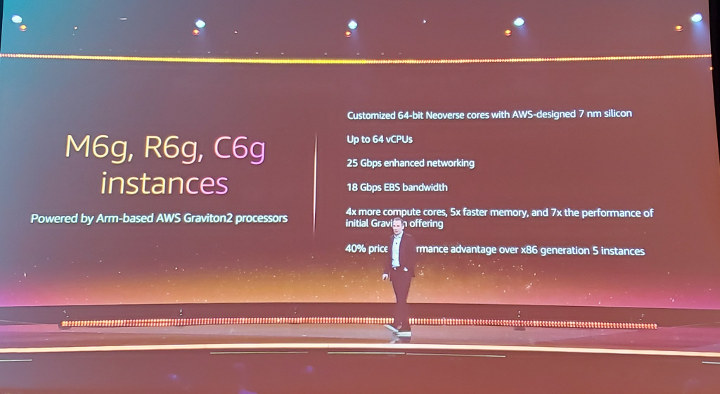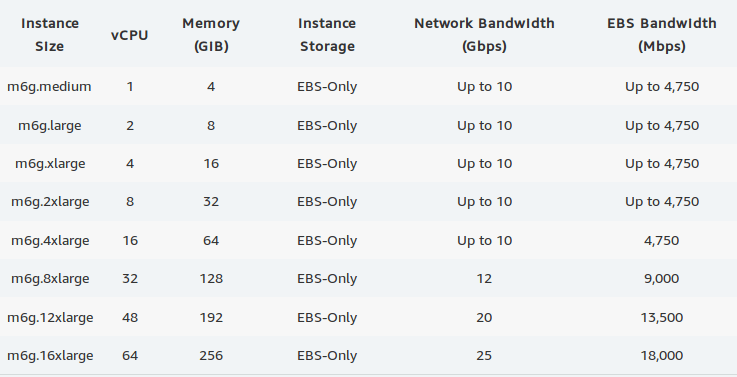Last year Amazon introduced their first 64-bit Arm-based ECS2 “A1” instances which were found to deliver up to 45% cost savings over x86 Instances for the right workloads.
A few months ago, AWS (Amazon Web Services) provides a new offering with bare-metal A1 instances, and with re:invent 2019 now taking place the company has unveiled AWS ECS2 6th generation Arm instances (which they did not call A2 instances yet) powered by Graviton 2 processor comprised of custom Arm Neoverse N1 cores and promising up to 7x the performance of the original A1 instances.

There will be three types of Graviton2-powered EC2 instances with the d suffix indicating NVMe local storage:
- M6g and M6gd for General Purpose workloads (application servers, mid-size data stores, microservices, and cluster computing) with 1 to 64 vCPUs and up to 256 GB of memory.
- C6g and C6gd for Compute-Optimized workloads (high-performance computing, video encoding, gaming, and CPU-based machine learning inference acceleration) with 1 to 64 vCPUs and up to 128 GB of memory.
- R6g and R6gd for Memory-Optimized workloads (open-source databases like MySQL or MariaDB, or in-memory caches such as Redis or Memcached) with 1 to 64 vCPUs and up to 512 GB of memory.
The instances will have up to 25 Gbps of network bandwidth, 18 Gbps of EBS-Optimized bandwidth, and will also be available in bare metal form.
R6 and C6 are not available, but M6 instances are in preview, meaning you’d need to request access before using one of the options listed below.
That also means M6gd instances with local NVME storage for applications that need access to high-speed, low latency local storage don’t seem to be offered just yet in the preview.
The new instances will eventually support Amazon Linux 2, Ubuntu, Red Hat, SUSE, Fedora, Debian, and FreeBSD operating systems, as well as various container services including Docker, Amazon ECS, and Amazon Elastic Kubernetes Service.
Some of Graviton 2 processor specifications:
- Cores – 1 to 64 custom Neoverse N1 cores with dual-SIMD, int8, fp16
- Cache – 64KB L1 cache, 1MB L2 cache, 32MB L3 cache
- Memory I/F – 8 DDR4-3200 channels with AES-256 encryption, 1Tbit/sec compression memory acceleration
- N1 cores connected by a mesh architecture with ~ 2TB/sec bandwidth
- Expansion – 64 lanes of PCIe gen 4
- Manufacturing process – 7nm
Compared to the A1 instances the new Graviton 2 powered instance can deliver up to 7x the performance, 2x the floating-point performance, and 5x faster memory access.
The company also reports performance enhancements over their 5th generation (M5, C5, R5) of EC2 instances based on the Intel Xeon Platinum 8000 series (Skylake-SP) processor. Those are the per-vCPU performance improvements over the M5 instances:
- SPECjvm 2008: +43% (estimated)
- SPEC CPU 2017 integer: +44% (estimated)
- SPEC CPU 2017 floating point: +24% (estimated)
- HTTPS load balancing with Nginx: +24%
- Memcached: +43% performance, at lower latency
- X.264 video encoding: +26%
- EDA simulation with Cadence Xcellium: +54%
You’ll find a few more details on AWS Graviton product page.

Jean-Luc started CNX Software in 2010 as a part-time endeavor, before quitting his job as a software engineering manager, and starting to write daily news, and reviews full time later in 2011.
Support CNX Software! Donate via cryptocurrencies, become a Patron on Patreon, or purchase goods on Amazon or Aliexpress






Title is a bit misleading — it’s 6th gen EC2 instances, but 2nd gen Arm instances. The 7x speedup is vs the 1st gen arm instances. Vs 5th gen EC2 compute instances (amd64) it’s approx 40% faster, as you’ve properly noted in the article.
OK. I’ve just removed the first Arm occurrence to avoid confusion.
Can you clarify the benchmark meanings please? The article doesn’t include the exact instances Amazon used for comparison. If a 64-vCPU M6g beats out the equally expensive 32-vCPU by these figures, that’s good, but if it’s actually 64 vs. 64, then that’s monumental news.
Sorry about that, if you refer to the list at the end that’s a per-vCPU performance comparison.